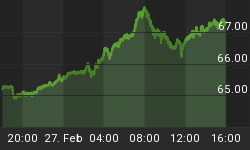If everyone says that shocks from outside the financial system -- so-called exogenous shocks -- can affect it for better or worse, they must be right.
It just sounds so darned logical, right? Economists believe this trope to be true, mainly because they believe that investors are rational thinkers who re-evaluate their positions after every new bit of relevant information turns up.
Beginning to sound slightly impossible? Well, yes.
It turns out that logic is exactly what's missing from this it-feels-so-right idea of rational reaction to exogenous shocks. Read an excerpt from Robert Prechter's February 2010 Elliott Wave Theorist to see how Prechter deals with this widely held belief.
Excerpted from Prechter's February 2010 Elliott Wave Theorist, published Feb. 19, 2010
The Efficient Market Hypothesis (EMH) argues that as new information enters the marketplace, investors revalue stocks accordingly. ... In such a world, the market would fluctuate narrowly around equilibrium as minor bits of news about individual companies mostly canceled each other out. Then important events, which would affect the valuation of the market as a whole, would serve as "shocks" causing investors to adjust prices to a new level, reflecting that new information. One would see these reactions in real time, and investigators of market history would face no difficulties in identifying precisely what new information caused the change in prices....
This is a simple idea and simple to test. But almost no one ever bothers to test it. According to the mindset of conventional economists, no one needs to test it; it just feels right; it must be right. It's the only model anyone can think of. But socionomists [those who use the Wave Principle to make social predictions] have tested this idea multiple ways. And the result is not pretty for the theories that rely upon it.
The tests that we will examine are not rigorous or statistical. Our time and resources are limited. But in refuting a theory, extreme rigor is unnecessary. If someone says, "All leaves are green," all one need do is show him a red one to refute the claim. I hope when we are done with our brief survey, you will see that the ubiquitous claim we challenge is more akin to economists saying "All leaves are made of iron." We will be unable to find a single example from nature that fits.
* * *
In his February 2010 Elliott Wave Theorist, Prechter then goes on to show charts that examine each of these claims that encompass both economic and political events:
Claim #1: "Interest rates drive stock prices."
Claim #2: "Rising oil prices are bearish for stocks."
Claim #3: "An expanding trade deficit is bad for a nation's economy and therefore bearish for stock prices."
Claim #4: "Earnings drive stock prices."
Claim #5: "GDP drives stock prices."
Claim #6: "Wars are bullish/bearish for stock prices."
Claim #7: "Peace is bullish for stocks."
Claim #8: "Terrorist attacks would cause the stock market to drop."
To protect your personal finances, it's important to think independently from the crowd, particularly when the crowd buys into what economists say.
Find out what really moves markets -- download the free 118-page Independent Investor eBook. The Independent Investor eBook shows you exactly what moves markets and what doesn't. You might be surprised to discover it's not the Fed or "surprise" news events. Learn more, and download your free ebook here.















